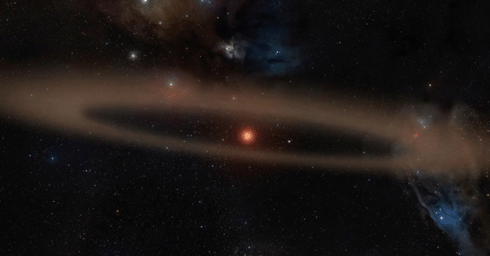
|
Young Star and Its Infant Planet (Artist’s animation)
- Click the image above for a larger view
 Movie Download Options
Movie Download Options- Full-Res JPEG (1260 x 658) (70.1 kB)
- Full-Res TIFF (1260 x 658) (1.4 MB)
Caption:
When a planet such as K2-33b passes in front of its host star, it blocks some of the star's light. Observing this periodic dimming, called a transit, from continual monitoring of a star's brightness, allows astronomers to detect planets outside our solar system with a high degree of certainty. This Neptune-sized planet orbits a star that is between 5 and 10 million years old. In addition to the planet, the star hosts a disk of planetary debris, seen as a bright ring encircling the star.
Background Info:
NASA's Ames Research Center in California's Silicon Valley manages the Kepler and K2 missions for NASA's Science Mission Directorate. NASA's Jet Propulsion Laboratory in Pasadena, California, managed Kepler mission development. Ball Aerospace & Technologies Corporation operates the flight system with support from the Laboratory for Atmospheric and Space Physics at the University of Colorado in Boulder.
More information about the Kepler mission is at http://www.nasa.gov/kepler .
Cataloging Keywords:
| Name | Value | Additional Values |
|---|---|---|
| Target | K2-33 | |
| System | K2-33 | |
| Target Type | Exoplanet | |
| Mission | Kepler | |
| Instrument Host | Kepler | |
| Host Type | Space Telescope | |
| Instrument | ||
| Detector | ||
| Extra Keywords | Artwork, Atmosphere, Color, Disk, Infrared, Movie, Orbit | |
| Acquisition Date | ||
| Release Date | 2016-06-20 | |
| Date in Caption | ||
| Image Credit | NASA/JPL-Caltech | |
| Source | photojournal.jpl.nasa.gov/catalog/PIA20692 | |
| Identifier | PIA20692 | |
